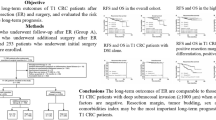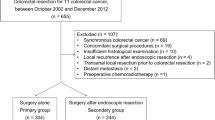Abstract
Background and aim
Radical surgery is recommended for T1 colorectal cancer with non-curative endoscopic resection. However, there is still insufficient evidence about whether the non-curative endoscopic resection prior to surgical resection affects the short-term and long-term outcomes of patients. The purpose of this study was to investigate the effect of non-curative endoscopic resection before surgical resection on short-term and long-term outcomes in patients with T1 colorectal cancer.
Patients and methods
Patients with clinical T1N0M0 (cT1N0M0) colorectal cancer who underwent direct surgery or additional radical surgery after non-curative endoscopic resection were collected. We evaluated postoperative complications and long-term prognosis between the two groups.
Results
From 2011 to 2017, 779 patients were clinically diagnosed with T1N0M0 colorectal cancer at Zhongshan Hospital. We assessed patients who underwent additional surgery following the prior non-curative endoscopic resection (n = 145) and patients who underwent radical surgery directly (n = 336). There was no significant difference in 5-year OS (99.3% vs. 99.4%, P = 0.866) and 5-year DFS (97.2% vs. 97.3%, P = 0.909) between the two groups. The total complication rate was slightly higher in prior endoscopic resection group (15.2% vs. 9.5%, P = 0.111). The 5-year OS and 5-year DFS of patients who refused additional surgery (n = 95) were significantly lower than ER prior to surgery group (For OS, 92.6% vs. 99.3%, P = 0.017; for DFS, 91.2% vs. 97.2%, P = 0.021).
Conclusion
In patients who underwent additional surgery, non-curative endoscopic resection of cT1 colorectal carcinoma did not have adverse effect on short-term and long-term outcomes. Additional surgery should be recommended in patients who received non-curative ER.


Similar content being viewed by others
References
Bray F, Ferlay J, Soerjomataram I et al (2018) Global cancer statistics 2018: GLOBOCAN estimates of incidence and mortality worldwide for 36 cancers in 185 countries. CA Cancer J Clin 68(6):394–424
Ferlay J, Colombet M, Soerjomataram I et al (2018) Cancer incidence and mortality patterns in Europe: estimates for 40 countries and 25 major cancers in 2018. Eur J Cancer 103:356–387
Backes Y, Moss A, Reitsma JB et al (2017) Narrow Band Imaging, Magnifying Chromoendoscopy, and Gross Morphological Features for the Optical Diagnosis of T1 Colorectal Cancer and Deep Submucosal Invasion: A Systematic Review and Meta-Analysis. Am J Gastroenterol 112:54–64
Watanabe T, Muro K, Ajioka Y et al (2018) Japanese Society for Cancer of the Colon and Rectum (JSCCR) guidelines 2016 for the treatment of colorectal cancer. Int J Clin Oncol 23:1–34
Tsunada S, Mannen K, Yamaguchi K et al (2008) A case of advanced colonic cancer that developed from residual laterally spreading tumor treated by piecemeal endoscopic mucosal resection. Clin J Gastroenterol 1:18–22
Kunihiro M, Tanaka S, Haruma K et al (2000) Electrocautery snare resection stimulates cellular proliferation of residual colorectal tumor: an increasing gene expression related to tumor growth. Dis Colon Rectum 43:1107–1115
Tsai WS, Chen JS, Shao HJ et al (2016) Circulating tumor cell count correlates with colorectal neoplasm progression and is a prognostic marker for distant metastasis in non-metastatic patients. Sci Rep 6:24517
Matsuda K, Masaki T, Abo Y et al (1999) Rapid growth of residual colonic tumor after incomplete mucosal resection. J Gastroenterol 34:260–263
Yamashita K, Oka S, Tanaka S et al (2019) Preceding endoscopic submucosal dissection for T1 colorectal carcinoma does not affect the prognosis of patients who underwent additional surgery: a large multicenter propensity score-matched analysis. J Gastroenterol 54:897–906
Tamaru Y, Oka S, Tanaka S et al (2017) Long-term outcomes after treatment for T1 colorectal carcinoma: a multicenter retrospective cohort study of Hiroshima GI Endoscopy Research Group. J Gastroenterol 52:1169–1179
Yamaoka Y, Imai K, Shiomi A et al (2019) Endoscopic resection of T1 colorectal cancer prior to surgery does not affect surgical adverse events and recurrence. Surg Endosc. https://doi.org/10.1007/s00464-019-07295-8
Urabe Y, Tanaka S, Saito Y et al (2015) Impact of revisions of the JSCCR guidelines on the treatment of T1 colorectal carcinomas in Japan. Z Gastroenterol 53:291–301
Dang H, de Vos Tot Nederveen Cappel WH, van der Zwaan SMS et al (2019) Quality of life and fear of cancer recurrence in T1 colorectal cancer patients treated with endoscopic or surgical tumor resection. Gastrointest Endosc 89:533–544
Belderbos TD, van Erning FN, de Hingh IH et al (2017) Long-term recurrence-free survival after standard endoscopic resection versus surgical resection of submucosal invasive colorectal cancer: a population-based study. Clin Gastroenterol Hepatol 15(403–411):e401
Tanaka S, Kashida H, Saito Y et al (2015) JGES guidelines for colorectal endoscopic submucosal dissection/endoscopic mucosal resection. Dig Endosc 27:417–434
Rickert A, Aliyev R, Belle S et al (2014) Oncologic colorectal resection after endoscopic treatment of malignant polyps: does endoscopy have an adverse effect on oncologic and surgical outcomes? Gastrointest Endosc 79:951–960
Chen T, Zhang YQ, Chen WF et al (2017) Efficacy and safety of additional surgery after non-curative endoscopic submucosal dissection for early colorectal cancer. BMC Gastroenterol 17:134
Yasue C, Chino A, Takamatsu M et al (2019) Pathological risk factors and predictive endoscopic factors for lymph node metastasis of T1 colorectal cancer: a single-center study of 846 lesions. J Gastroenterol 54(8):708–717
Kim B, Kim EH, Park SJ et al (2016) The risk of lymph node metastasis makes it unsafe to expand the conventional indications for endoscopic treatment of T1 colorectal cancer: a retrospective study of 428 patients. Medicine (Baltimore) 95:e4373
Nakadoi K, Tanaka S, Kanao H et al. Management of T1 colorectal carcinoma with special reference to criteria for curative endoscopic resection. J Gastroenterol Hepatol 2012; 27: 1057–1062.
Overwater A, Kessels K, Elias SG et al (2018) Endoscopic resection of high-risk T1 colorectal carcinoma prior to surgical resection has no adverse effect on long-term outcomes. Gut 67:284–290
Lee S, Kim J, Soh JS et al (2018) Recurrence rate of lateral margin-positive cases after en bloc endoscopic submucosal dissection of colorectal neoplasia. Int J Colorectal Dis 33:735–743
Acknowledgements
This study was supported by The National Natural Science Foundation of China (81602035, 81472228); The Shanghai Municipal Health Commission: Shanghai Outstanding Youth Specialist Training Program (Q2017-059); Clinical Science and Technology Innovation Project of Shanghai (SHDC12016104); and Shanghai Engineering Research Center of Colorectal Cancer Minimally Invasive (17DZ2252600).
Author information
Authors and Affiliations
Contributions
Yu Liu, Ran Li, Wenju Chang and Jianmin Xu designed the study, and were involved in patients’ management. Tianyu Liu and Yijiao Chen helped in the study design and revised the manuscript. Yunshi Zhong and Ran Li performed endoscopic resection. Li Ren, Ye Wei and Jianmin Xu performed surgical treatment. Yu Liu, Yijiao Chen and Minzhi Lv performed the statistical analyses. Yu Liu wrote the manuscript. Wenju Chang critically reviewed and revised the manuscript. All authors have read and approved the final version of the manuscript.
Corresponding authors
Ethics declarations
Disclosure
Yu Liu, Ran Li, Wenju Chang, Li Ren, Ye Wei, Tianyu Liu, Yijiao Chen, Minzhi Lv, Yunshi Zhong, and Jianmin Xu have no conflicts of interest or financial ties to disclose.
Additional information
Publisher's Note
Springer Nature remains neutral with regard to jurisdictional claims in published maps and institutional affiliations.
Electronic supplementary material
Below is the link to the electronic supplementary material.
Rights and permissions
About this article
Cite this article
Liu, Y., Li, R., Chang, W. et al. The effect of non-curative endoscopic resection on cT1N0M0 colorectal carcinoma patients who underwent additional surgery. Surg Endosc 35, 2862–2869 (2021). https://doi.org/10.1007/s00464-020-07722-1
Received:
Accepted:
Published:
Issue Date:
DOI: https://doi.org/10.1007/s00464-020-07722-1




